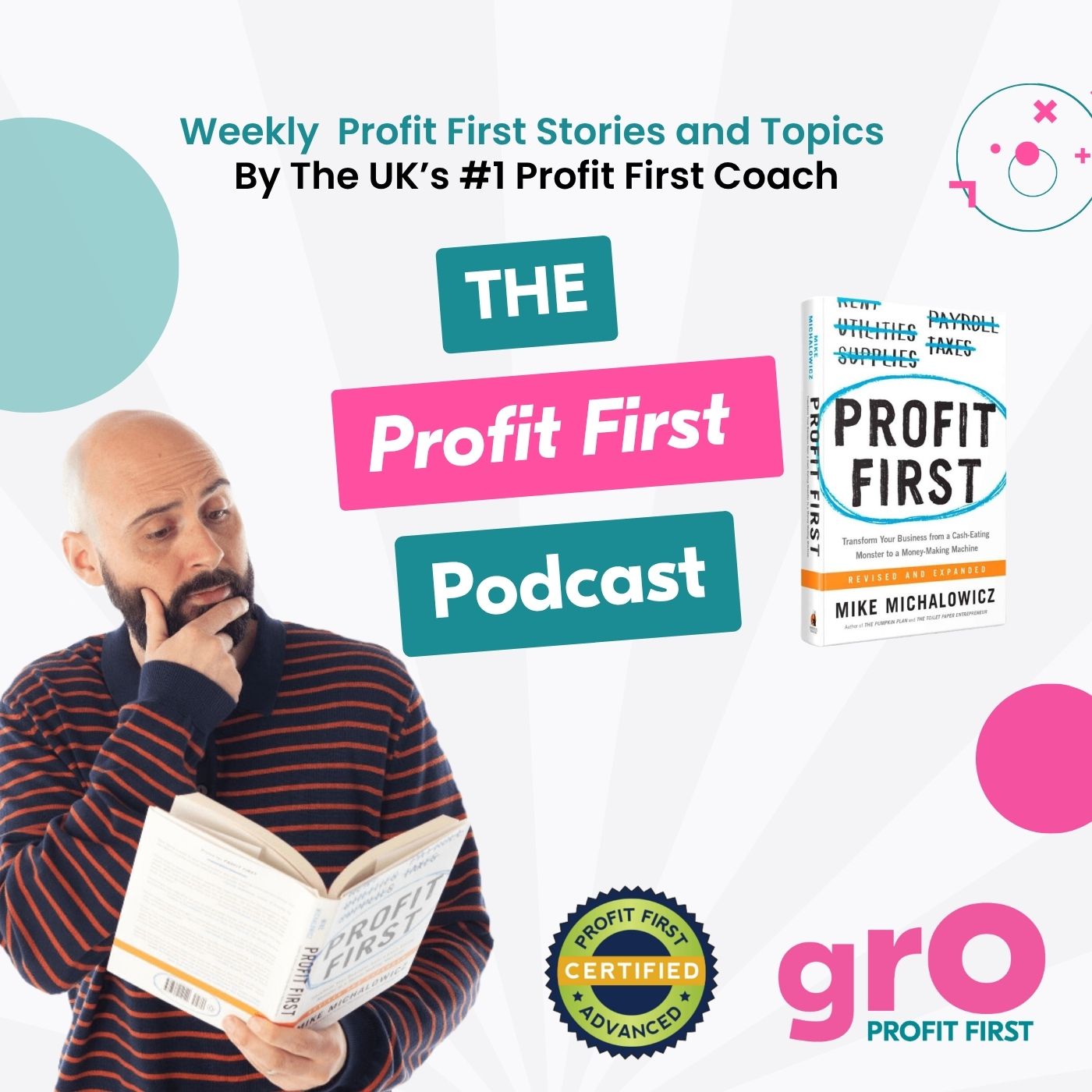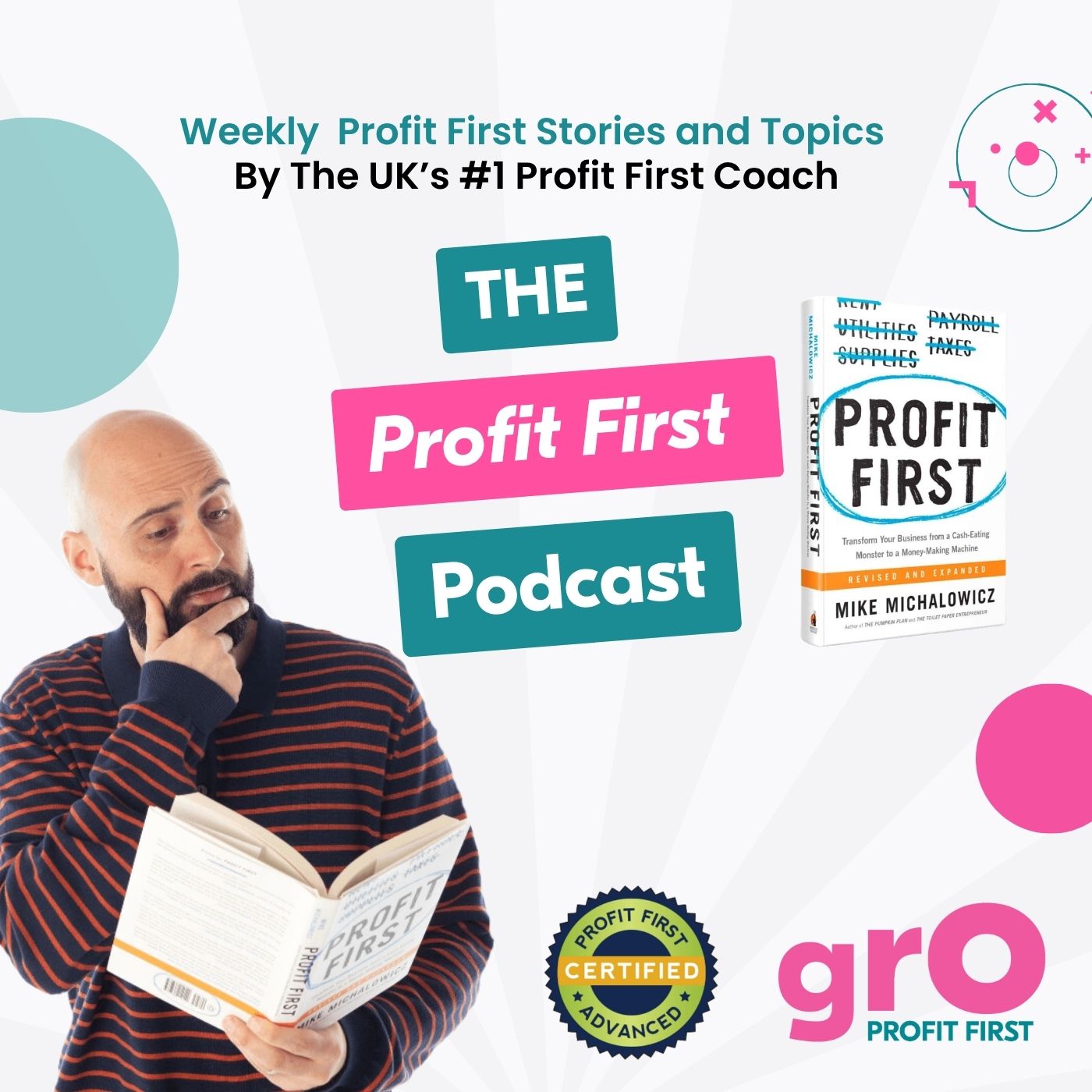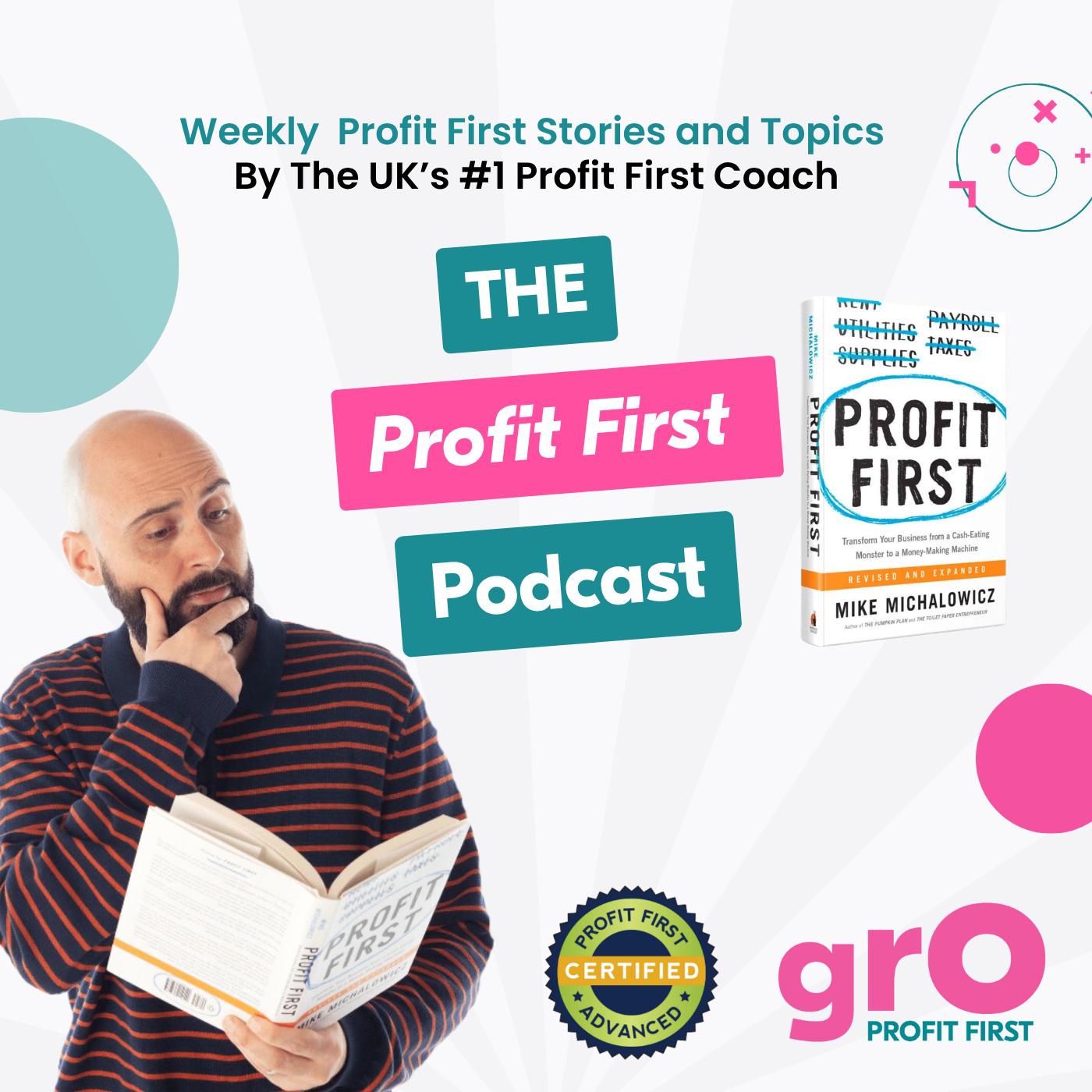Episode Transcript
[00:00:00] Excuses. Here I am. So, hi, guys, and welcome to this week's Profit first podcast. So, I'm Stephen Edwards, the founder of Grow Profit First Accountants. We're an accountancy practice in the UK and we specialise in Profit first and we help entrepreneurs basically put more money in their bank and increase what they pay themselves personally. So the Profit first podcast, the kind of foundation, the core, the pillarstone, is Profit First. However, if you've been following the Profit first podcast for some time now, you can also find our newsletters online. The Profit First Club. It's on a platform called Beehive. You will know that, yes, we talk about Profit first most weeks, but ultimately, profit first is not the outcome in itself. The outcome is how can you build a business that's sustainable, that's profitable, that gives you the lifestyle that you want for yourself and for your family.
[00:00:59] That is the most important thing. And that's why we're so passionate about Profit First. But it also means we need to bring in other things that are going to help the business owner kind of put that puzzle together. There's all these pieces in the puzzle to build in a dream business, building your dream life, and it takes time. It is building blocks. That's why people say you build a business, you don't just kind of create a business instantly. Even though we've got AI in everything nowadays, you got to build it one block at a time. But the truth is, some of those blocks are more important than others.
[00:01:35] Making distinctions, knowing what to prioritize, what to focus on, is going to be the topic of this week's Profit First Podcast. So if you're like me, you're an entrepreneur, you probably have lots of different ideas, you have lots of different opportunities, and more so now than ever, in my experience, in 2025, you can @ times feel overwhelmed. You can feel that there's just so much to do.
[00:02:05] Even if we move beyond the fact that we've got that stress, we've got that kind of pressure of paying the bills, paying the overheads, paying ourselves. If you've got a team, paying your team members, that's before we even think of growing. We're just kind of making things tick over and, you know, that's our kind of core focus. That's the survival side of being a business owner.
[00:02:26] Most people get stuck there and Profit first as a system really helps you make sure you prioritize yourself.
[00:02:34] Not just, you know, turnover is vanity, profit, sanity. Not just winning more clients and customers and sales and revenue for the sake of it. It's all about you as the owner, paying yourself more.
[00:02:47] However, there's other things that are going to make you a better, more professional, more level headed, better leader, better business owner, better entrepreneur, better husband, father, better friends.
[00:03:00] And I'm 42, I turned 42 this year and I've been running this business for around 13 years and I've been on a self development, personal development, growth journey in that time.
[00:03:12] And the truth is you cannot really grow a business unless you grow yourself. If you speak to a lot of business owners that are stuck, they're playing the blame game. They're blaming the economy, they're blaming their team, they're blaming the customers, they're blaming technology, they're blaming the government, they're blaming whatever else is going on in the world. And I'm not saying we should be naive to ignore other factors.
[00:03:38] It has been one of the most challenging economic environments I've seen in the last couple of years. However, we need to be more resilient. We need to be more strong minded. We need to have a foundation of certainty in terms of what's the right thing to focus on, on my business, what's true if we just go along with every single, you know, bit of news and if we chase all these new, shiny new ideas.
[00:04:03] If you're like me, you're listening to this podcast, you probably listen to other podcasts, you probably read books, you probably go on to watch like Stephen Bartlett and the Diary of a CEO. And you follow all these sort of well known people and you often don't feel that you've got more clarity.
[00:04:20] You often feel you've just got more things to do. It's just adding to a to do list. You're like, that's a great idea. I need to do that. I need to go to that next workshop, that next event, that book, and I'm guilty of this. I recommend lots of different books to different people.
[00:04:36] However, I made a huge distinction in 2024 and it's become my theme of 2025. And the theme is less is more.
[00:04:47] You've probably heard of the Pareto principle, the 8020 principle, the 8020 rule, that 20% of what we do probably has 80% of the impact. It might not be those exact numbers, but it's not a 5050 thing. If you look at, if you've got, you might feel like you've got 100 things to do on your list, but I bet you can get that down to 20.
[00:05:08] If you look at that hundred, you need a filter to get it down to the top 20%. And it's actually how I plan my week nowadays is what the most important things that's going to move the needle and get me closer to where I need to go.
[00:05:24] The challenges, the noise, the firefighting, the drama, all the survival stuff that happens, that's still going to happen. You still need to deal with that. However, you need to be intentional with your time. You need to make sure there's time for your priorities. Whatever kind of system you use, it might be certain days of the week, it might be first thing in the morning for a lot of people. You know, we're members of the entrepreneur circle, which is a fantastic organization. And Nigel Botterill, the founder, he talks about, he calls it your 90 minutes a day. Your 90 minutes a day is pretty, pretty much those 20% activities. What's the things that are really going to move the needle, move forward, and then the 80% of the day, the noise can kind of take over.
[00:06:10] If you can get it done in the morning, that's quite useful, powerful for a lot of people. But it doesn't really matter when you do it. It's just that you, you spend time on that top 20%.
[00:06:19] The next thing is how do you know what to spend your time on?
[00:06:24] How do you know what the most important thing is to spend your time on? So last year I released my book, how to build a business that runs without you. And the irony is, yes, I do still work in my business, but I've got freedom to do the things I love to do. So it's kind of building a business that can run without you, but it gives you that freedom. And the reason I talk about that is number one on my entrepreneurial freedom system. Number one, there's a ten step process, how to build a business that runs without you. You can get it on Amazon.
[00:06:56] Number one is you've got to have a vision. What are you actually trying to do? And I really, if you've heard this before and you're kind of, your eyes are rolling, you're thinking, I've heard this before.
[00:07:08] Question I want to ask you is, are you doing it? Have you got your vision written down? Do you think about it on a regular basis? Do you think about it at least every month, if not every week or every single day? Are you clear on what your ideal week looks like, what your ideal life looks like? How many hours you work, how much money you need to earn to live your dream life? What does your dream life look like? How many holidays do you go on? Where do you go on holiday, who do you spend your time with, what do you do in the business on a daily basis? You need to have a clear vision. The more why's you have, the more reasons you've got to be successful, the more must you have, the more powerful it is as a magnetic force to drive you forward. So you need to have a clear vision. Once you've got a clear vision, you can then figure out I won't go through the whole entrepreneurial system, freedom system. Now of the book, as I said, how to build a business that runs without you. But you need a numbers plan, you need to be clear on the numbers.
[00:08:03] So essentially you need to know where you're heading. If I want to go on holiday, I normally know where I'm going and I know what airport I'm going to leave from, where I'm going to land and probably what that looks like when I'm going to go on holiday. Yes, a little bit of mystery and variability is, is good, the surprise element. But ultimately you're going to have a plan and your life and your business is the same. And essentially what I'm trying to do is help you vision what you're trying to achieve. And then we need to figure out what are the most important things for me to do this year that's going to move me in that direction.
[00:08:37] You don't have to wait until January to do your New Year's resolutions to think like this. You should be thinking like this all the time.
[00:08:44] And once you know what you're going you need to do for the year that's going to move you forward. And you want to be realistic, but also slightly ambitious. You want to make sure it motivates you and it energizes you what you're trying to achieve, but it's also grounded in realism.
[00:08:59] And then you can bring it down to what am I going to do in the next 90 days, what am I going to do in the next quarter?
[00:09:05] Quarter by quarter, you know, every 90 day period we're going to get closer to what we're trying to achieve in our business, in our life, and only then can you then get down to what's important for the month, what's important for the week, what's important for the day.
[00:09:22] So we could have a hundred things to do on our list, but the truth is only so many of those things are going to move you towards where you want to get to in your life and your business. So I want you to use this filter to question is this relating to a project or a goal. Something's going to move me forward in my business in the next quarter.
[00:09:42] If it's not ready for the next quarter, but it could be for the next year, park it up for later on and that's going to give you your focus for the week. You don't need more things, you don't need more ideas to be successful in your business. You need to do less.
[00:09:55] You need to do less, but you need to do it better. You need to be more focused.
[00:09:59] If you've seen Stephen Bartlett's book, I think it's 33 laws of business or Growth of Business, the diary of a CEO he talks about often our energy is scattered and we've got maybe, I don't know, 5% of our energy in 20 different places, which gives us 100% instead of one arrow given a hundred percent of our energy on that one thing want to move us forward. And obviously that's a black and white example. It's not always possible to concentrate on one thing, however, what's the few things? What's that? 20% of the projects, the activities that are really going to drive your business forward.
[00:10:40] That's the lens, the filter. That's how you get less overwhelmed. Not everything on your list is equal. And bringing it back to profit first. I would say understanding your numbers is one of those 20% things. If you don't know, if you haven't got a roadmap, how to improve your profits, how you're going, what you need to cut expenses on in the next three months, what your numbers need to look like to give you the life you want. If you don't know what that destination looks like and you haven't got a plan, a bit like going to the gym, then you're far less likely to make it happen. So I would argue understanding your numbers and profit first is one of the most powerful tools to do that is one of those 20% activities. They're going to move you forward. And then you need to choose what are the other projects and activities and KPIs that are going to move you forward. And finally, you know, we're not machines.
[00:11:33] The one thing that underpins my entrepreneurial freedom system is mindset and well being. I go to the sauna two, three times a week. I work out a few times a week. I go for walks all the time. I meditate. You know, I can't always switch off, but I definitely have time to switch off. I do lots of activities throughout the year.
[00:11:52] Sometimes if you're just feeling stressed, figuring out more is not the answer. You just probably need some time off. I shared recently taking time off to go to Palmer for my 42nd birthday in Mallorca. It gave me that clarity, it gave me that reset and it renewed my energy. And it might be a day off, it might be a weekend off. Please do not wear it as a badge of honor if you don't take any time off, because trust me, it's not the smart thing to do. There are times to grind. There's times to get up at 5am in the morning like I did the other week, to go to London. I didn't get back to 9pm I went there for a workshop, which was an amazing sort of experience and around some really inspiring entrepreneurs.
[00:12:33] However, we can't do that all the time. So there's a time to grind and there's a time to relax. And sometimes you need to know what kind of mode you're in. And if you feel like you've just been grinding, grinding, grinding, if everything feels a chore, everything feels hard, you feel overwhelmed, it might seem counterintuitive, but I'd actually advise you to take some time off, even if it's just a short break. What we've tried this year is sometimes staying away for a Friday evening and it might be somewhere local to us. We're based in Gloucestershire, it could be Bristol, it could be Stratford, it could be Bath. But just having a night away on Friday evening. But we leave, have the Friday off from work because I only work half a day typically anyway, on a Friday, leave early Friday, have the whole day in that location and I've got the next day and we come back in the afternoon and it feels like I've had a weekend away for just actually one night away really.
[00:13:23] So get a bit creative and figure out what you can do to kind of reset. It might just be going for a long walk on the weekend when the sun's out. We walked the dogs recently, we're on the edge of the Cotswolds, went for a lovely walk, couple of hours and that could be a huge reset. Spending time in nature, you need to do things to switch off.
[00:13:43] Any questions, guys, feel free to reach out to me, drop me an email, drop me a message. More than happy to connect and speak to you soon. Excuses. Here I am. So.


